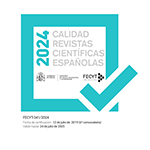The command of time in Leon Battista Alberti’s "Momus", "I Libri della Famiglia", and "Intercenales"
Abstract
The large and heterogeneous work of Leon Battista Alberti (1402 - 1472) is based on two confronted visions of the world: the “paradigm of the absurd” and the “paradigm of the reason”. Both come from the same recognition of reality: the precarious character of the human existence, submitted by the swings of fortune and by the implacable power of fate. Faced to this situation, I libri della Famiglia, Momus and the Intercenales elaborate different vital answers, which represent the fluctuation of Alberti’s thought between the rational and the irrational, the chaos of the fortune and the shape that the human being tries to give his world, expressed as the attempt of building a human time. This attempt is different if it deals with the “paradigm of the absurd” or with the “paradigm of the reason”: while in the former the man builds his own time in order to escape from the precariousness of the existence, confirming the absurd character of life, in the latter human appropriation of the time allows the rising of a virtuous reason.Downloads
Article download
License
In order to support the global exchange of knowledge, the journal Cuadernos de Filología Italiana is allowing unrestricted access to its content as from its publication in this electronic edition, and as such it is an open-access journal. The originals published in this journal are the property of the Complutense University of Madrid and any reproduction thereof in full or in part must cite the source. All content is distributed under a Creative Commons Attribution 4.0 use and distribution licence (CC BY 4.0). This circumstance must be expressly stated in these terms where necessary. You can view the summary and the complete legal text of the licence.










